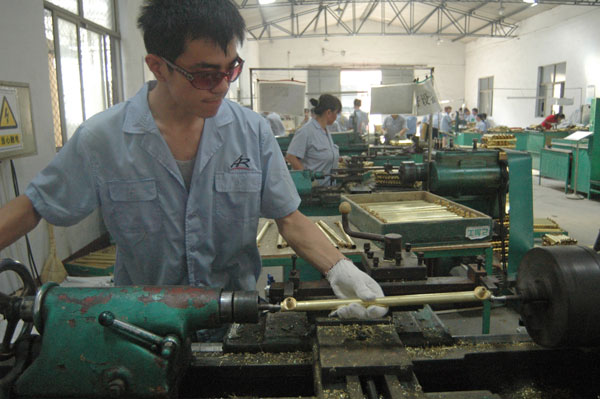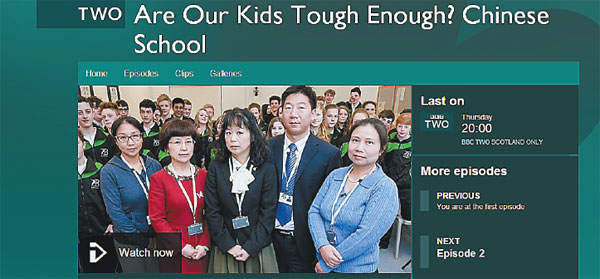Worlds apart and in a different class
Updated: 2015-08-10 07:44
By Zhang Zhouxiang and Zhang Chunyan(China Daily)
|
|||||||||||
|
The BBC documentary has prompted heated online discussion about the Chinese and British education systems. BBC Website |
Writing on Weibo, a Chinese Twitter-like platform, "Chu-hsi" commented: "Chinese classroom discipline is too strict to some degree. A free-style classroom means that students discuss academic issues in a better atmosphere, but also means eating, putting on makeup or doing whatever you like. The British students lack the most basic politeness, which is an issue of upbringing." The comment quickly attracted more than 2,000 "likes".
Many British netizens felt the same. One comment on Twitter that read "British education has gone soft. Teachers are abused and students have no discipline" gained 5,693 "likes" in next to no time.
Sarah Robertson, who identified herself as a BBC journalist writing in a personal capacity, tweeted that the documentary was "an insight into the sheer lack of respect some British teenagers have for teachers'.'
On a BBC debate, John Lester, 80, commented, "When I was at school during and after the war, we had discipline in schools."
Conversely, some commentators, such as columnist Simon Jenkins, were less impressed. "China's schools are testing factories. Why is Britain so keen to copy them?" Jenkins asked in his Guardian column.
"Chinese parents crave the British private schools being set up across China. Chinese students cram into US and British universities. They can see that a dragooned, mechanically competitive schooling is no path to creativity, challenge or happiness in the long run in a dynamic economy and a critical open society," he added.
Neil Strowger, Bohunt School's head teacher, told China Daily the children had found the experience tough for a number of reasons. "Some of the students did find the Chinese way of teaching a challenge and much of that was because the Chinese school day is longer than ours and the teaching approach is very different. We typically have seven or eight hour days, which meant that being taught for 12 hours came as a bit of a shock to some of the children," he said.
In an e-mail exchange with China Daily, the BBC commented: "This series was made to examine the significant differences between the Chinese and the British approaches to education ... For several years some of the East Asian countries have beaten the UK on core subjects in international league tables, and we wanted to explore if their approach could be transferred to the UK classroom."
Cameras were set up to capture the experiment, and to "give a true representation of how the students reacted to the Chinese teaching style". Bohunt School was chosen because it has "a good record of immersing their students in Mandarin teaching, which made it an ideal school for this series", the program maker said.
Despite the access given to the TV crew, some viewers, such as Sun Yunxiao, a researcher at the China Youth and Children Research Center in Beijing, felt some scenes were not consistent with the realities in China or the UK.
"The essence of Chinese-style education is to teach every student to discover his or her own strengths," Sun said. "We share that with the UK, but we didn't see that in the documentary."
"Tiangongzi", who has experience in both systems, echoed those sentiments. "They did the documentary in a British state school where lack of discipline is a common problem. Having attended a private school in the UK, I had to face three roll-calls every day and faced suspension for any disciplinary violation; three times and the violator would have to quit," he wrote on zhihu, a discussion forum, earning 946 "likes".
Wang Chengjun, a math teacher from Shanghai who attended a three-week teacher exchange and taught in a primary school in England in March, said British students are active in class, but are far from uncontrollable.
Strowger, who was quoted by the Times as saying the Chinese teaching style is about "delivering a monologue" and not about working with students, said, "The students who took part in the program did enjoy the experience and took a lot from it".
One major talking point occurred when disruptive students were punished by being made to stand in front of the class, a practice that was discontinued in UK schools decades ago.
"In China, we consider that as something to be disposed of, too. It's only used in schools with low standards. Those that have adopted modern values have long abandoned it," said Chu Zhaohui, a researcher at the National Institute of Education Sciences in Beijing.
According to the Chinese media, only two of the teachers - Zou and Li - were recruited directly from China, while the others are long-term UK residents who may not be familiar with current conditions in their home country.
"We are improving but it may take a while for the idea of equality to become rooted in the minds of both teachers and students," Chu said.
Today's Top News
Greece, lenders in stretch run to to seal new bailout
State Council approves plan to overhaul SOEs, claims report
Amazing China 2015 photo contest unveiled in Beijing
China's HK CTS Metropark buys Kew Green, manager of Brighton's Grand Hotel
Chinese companies finding credibility abroad
Sun Yang is no-show for 1,500 free final at worlds
Measuring women's bust shows how dating is transforming
China rejects Philippine, Japanese, US claims on S. China Sea issue
Hot Topics
Lunar probe , China growth forecasts, Emission rules get tougher, China seen through 'colored lens', International board,
Editor's Picks

|

|

|

|

|

|







